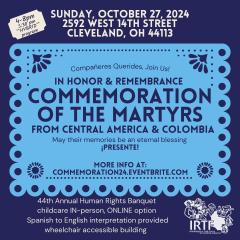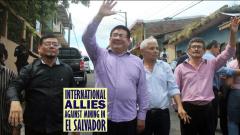As Guatemalan Democracy Falters, Indigenous Communities Stand Their Ground
NACLA, September 20, 2024
Ancestral authorities played a decisive role in counteracting a right-wing backlash. In their vision for liberation, alternatives are built from the grassroots, regardless of the government in power.
Turning a page on tumultuous months of uncertainty, Bernardo Arévalo was inaugurated as president of Guatemala in January. Immediately after his midnight swearing-in ceremony—delayed several hours due to opposition maneuvers—the new president visited the Indigenous-led encampment that had maintained a presence outside the public prosecutor’s office in Guatemala City for more than three months to ensure a peaceful transfer of power. “Today,” he told the crowd, “there is a democratic government that you, the Indigenous peoples gathered here for 106 days, have been able to save.” He thanked the ancestral authorities for defending democracy.
Arévalo’s upstart win in the August 2023 runoff came as a surprise to many. Ahead of the first-round vote, his poll numbers sat in the low single digits. And his campaign as a left-of-center reformist ladino (non-Indigenous person) running on an anticorruption platform with the Movimiento Semilla party contrasted with the rising right-wing authoritarianism under recent governments. After a campaign period marked by democratic backsliding, Arévalo faced various efforts aimed at sidelining his party and preventing him from taking office, sparking the indefinite national strike (#ParoNacionalIndefinido) in early October.
Despite Arévalo’s support for the Indigenous communities behind the strike, several concerns quickly emerged about the limitations of his government. His 14-person cabinet, announced a week before his inauguration, included only one Indigenous minister and two from the powerful private sector lobby CACIF. These picks did not bode well for the advancement of discussions and demands regarding Indigenous rights, including proposals for plurinationalism, championed most visibly by Thelma Cabrera, a presidential candidate who was prevented from running. However, the indefinite national strike offered a poignant reminder of the strength of Indigenous movements and the ancestral authorities, and the pitfalls of expecting change from “above.”
As Juan Caniz, a Maya Kaqchikel leader from Sololá who joined the encampment at the prosecutor’s office, told the media outlet Plaza Pública ahead of the inauguration: “We’re not here for Arévalo, we’re here for the defense of democracy. Therefore, the president-elect will be very clear that if he does things as they were done in the government of Alejandro Giammattei, we will be there to speak up.”
Before Arévalo’s election, several candidates were disqualified, undermining the conditions for a free and fair race and further weakening the rule of law. Among those barred from the race was Cabrera, a Maya Mam activist who ran as the candidate for the Movement for the Liberation of the Peoples (MLP) party. Electoral authorities excluded her after her vice-presidential running mate, former human rights ombudsman Jordán Rodas, was prevented from formally registering as a candidate due to false allegations of wrongdoing in his role as ombudsman.
Together, Cabrera and Rodas, who was forced into exile for his work on human rights and anticorruption, made a formidable oppositional ticket. In the 2019 elections, Cabrera had finished fourth in the first-round presidential vote with 10 percent, just four points behind the eventual winner, the right-wing Giammattei. There were high expectations that Cabrera would have a better showing in the 2023 elections and possibly make it to the second round, which was likely the true motive for her exclusion.
Cabrera and the MLP found support in calling in their platform for a Popular and Plurinational Constitutional Assembly that would write a new constitution to establish a plurinational state. Although this demand has circulated for years within Indigenous movements, Cabrera and the MLP’s participation in the 2019 election, and exclusion in 2023, brought increased attention to it in national political discussions.
Over the last decade, frustration and discontent with an inept and corrupt state have given rise to a series of Indigenous-led national strikes and calls for structural change. The creation of a plurinational state is often framed as a pathway to promote the rights and autonomy of Indigenous peoples, who have historically been marginalized, oppressed, and excluded by a racist, patriarchal, extractivist, neoliberal state. Indigenous-led strikes and protests manifest demands for liberation and plurinationalism from “below” in praxis, expressing Indigenous peoples’ struggles for an equitable and dignified collective future.
Guatemala’s 1985 Constitution states that the country is made up of “diverse ethnic groups,” including “Indigenous groups of Maya descent.” At the end of the 36-year internal armed conflict, the government committed in the Agreement on Identity and Rights of Indigenous Peoples—signed enroute to the 1996 peace accords—to take steps to recognize the Maya, Garifuna, and Xinka peoples and reform the constitution to enshrine the “multiethnic, pluricultural, and multilingual” character of the Guatemalan state. The reform was never implemented.
Today, Indigenous peoples continue to confront multiple forms of state-sponsored violence and dispossession. The end of the war ushered in a neoliberal multicultural Guatemala that claimed inclusivity of Indigenous peoples but continued a colonial legacy of extractive violence, now exacerbated by neoliberal policies that expanded mining and hydroelectric operations run by foreign corporations. The root causes of the war, namely unequal land access and other structural inequalities, were not resolved, fueling generations of forced displacement and migration abroad. In recent years, the network of self-interested business figures, military personnel, and politicians that has enabled and maintained the corrupt state has become known as the “Pact of the Corrupt.” Many Guatemalans saw this pact, which includes CACIF, as the architects behind the backlash against both Cabrera and Arévalo.
For some, a plurinational state would reorganize social relationships and rectify long-standing structural and institutional inequalities by recognizing Indigenous territorial rights, political autonomy, and buen vivir (good living/living well) as an alternative to capitalism.
In Guatemala, debates on plurinationalism as a form of Indigenous and territorial autonomy have emerged within communities and grassroots organizations. About a decade ago, groups including the Maya Waqib’ Kej National Convergence and the Campesino Development Committee (CODECA), among others, began pronouncing calls for a plurinational state. While each organization has their own action plan and interpretation of what that would look like, there is a consensus that it would require the recognition of the four peoples that make up the country (Maya, Xinka, Garifuna, and mestizo), the promotion of buen vivir, and steps to remedy the state’s colonial, racist, patriarchal, and genocidal logics. In recent years, discussions about plurinationalism have featured during national mobilizations, most notably the 2021 Indigenous-led plurinational strike (#ParoPlurinacional), which called for the resignation of President Giammattei and the convening of a plurinational constituent assembly. These demands have echoed on social media with the hashtag #EstadoPlurinacionalYa (plurinational state now).
CODECA, founded in the 1990s, is one of the groups at the forefront of promoting plurinationalism. In 2016, CODECA outlined their understanding of plurinationalism in a document titled “Toward a Popular and Plurinational Constituent Assembly.” The text argues that the Guatemalan nation-state was founded by a small criollo elite that legalized racism and sexism, marginalizing women and Indigenous and Black peoples for the last 200 years. It stresses the need for grassroots solutions to construct a new plurinational state, defined as “the expressed will of all the peoples and sectors that coexist in a country.” The document adds: “The plurinational state recognizes and guarantees the collective and individual rights of all peoples equally and seeks general well-being and peaceful and intercultural coexistence.”
In 2018, CODECA, alongside other social movements, established the MLP as a political instrument to further their objective. Cabrera, a founding member of CODECA, was selected to represent the party, and the construction of plurinationalism became a key pillar of the MLP platform in both the 2019 and 2023 election cycles. In 2023, Cabrera told me: “MLP is a national project that proposes to write a new political constitution originating from the peoples and a constituent assembly process to change the entire political and judicial situation and all the rights that are now being violated in Guatemala.” These proposals, she said, “posed a threat to the interests of CACIF or of the powerful here in Guatemala,” which is one of the reasons she was prevented from running for office.


